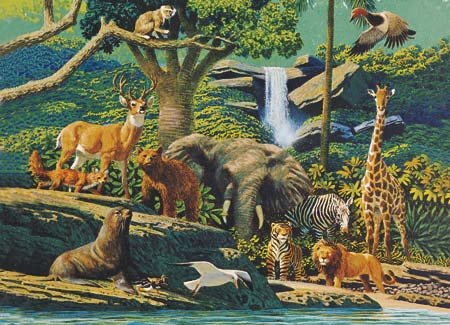Last week in my Sunday post I looked at how a 7 day 24 hour period for "the creation" became a dominant idea that still persists today.
Today I want to actually look more deeply to see what the scriptures actually say as opposed to what we often assume they say.
To do this one needs to set existing notions aside (like the 3 wise men visiting the manger) and actually examine the wording as it stands. If our thinking is a little boxed in on the matter I recommend we step out of the box for a little.
Genesis 1 speaks of a division of light and dark and these being called day and night respectively. The creative activities are then broken up into days, with an evening and morning.
3 And God said, Let there be light: and there was light.
4 And God saw the light, that it was good: and God divided the light from the darkness.
5 And God called the light Day, and the darkness he called Night. And the evening and the morning were the first day.
...
8 And God called the firmament Heaven. And the evening and the morning were the second day.
... and so forth... at the end of each period of creative activity the phrase " the evening and the morning were the ... day" is used to terminate it.
If one is following closely in English then one have to ask oneself "Where is the afternoon?" Its nowhere found mentioned. If we are taking what is written in English literally then we either need to concede that there is some information missing or that this phraseology is a vestige or result of the translation from another language where this type of phraseology is acceptable.
Indeed if we look at Hebrew (what Moses would have been writing in, or least an archaic form of it) the day cycle runs from sunset to sunset unlike from midnight to midnight as is now the case in our day.
Having followed this line of reasoning, even the "literalist" has to now allow for Hebrew thinking and literary practices to influence their literal interpretation.
If we are allowing for Hebrew influence in our interpretation then it is acceptable that "day" can mean more than just a 24 hour period. Day is in other places equated with 1000 years or even longer indeterminate eras or dispensations of time. The Hebrew word used in the Genesis one is most often associated with a 24 hour period but please humor me a little longer. (We are stepping outside the confining box remember.)
There is a grouping of those who entertain the one thousand years or longer interpretation of Genesis 1 days.
Lets explore the creation account from this viewpoint. If we are trying to reconcile current scientific consensus about the origin of the earth with the creation account we would need to apportion periods of billions of years to the Genesis 1 "days".
Clearly then we would need to concede that the account is not particularly detailed and generalized. With this simple view in mind all seems to be reasonably OK until we hit day 3 and 4.
On day three, plants are created but on day four the sun, moon and stars put in an appearance. This is problematic from a scientific perspective since photosynthesis is reliant on sunlight.
To reconcile this we would need to resort to intellectual acrobatics to explain that the plants must have been able to function on the light mentioned on day one and that complicates the view we are exploring.
Next we find on day 5" winged fowl" created and filling "the firmament" before animals are created. This is once again problematic. "Winged fowl" or birds as we know them are descended from reptilian ancestor, a remnant of the dinosaurs.
So, unless these "winged fowl" are the six foot dragonflies, when insects ruled the earth, we have some more intellectual gymnastics to do.
So having the days represent longer periods or epochs is still not as simple and clean a solution. We still have to resort almost as much acrobatics as 24 hour day creationists.
The text as it is currently written just does not seem to be reconcilable with what is recorded in the rocks, fossils and genetic record repositories of the earth with reliance on a lot of "creativity" that doesn't seem to be recorded there or discovered yet.
Allowing that the text is Hebrew there is a possibility that use of "days" does not refer to a sequence of time periods at all. That the "days" are simply part of a Hebrew literary device and are parentheses to the ideas contained therein and the sequence of concepts that is being created in order to illustrate and emphasize the point of the account.
Next week I will delve into this in depth, but for now, there is some home work for those who are not familiar with Hebrew literary devices.
@gavvet/tough-questions-on-science-and-the-bible-understanding-how-the-bible-was-written

